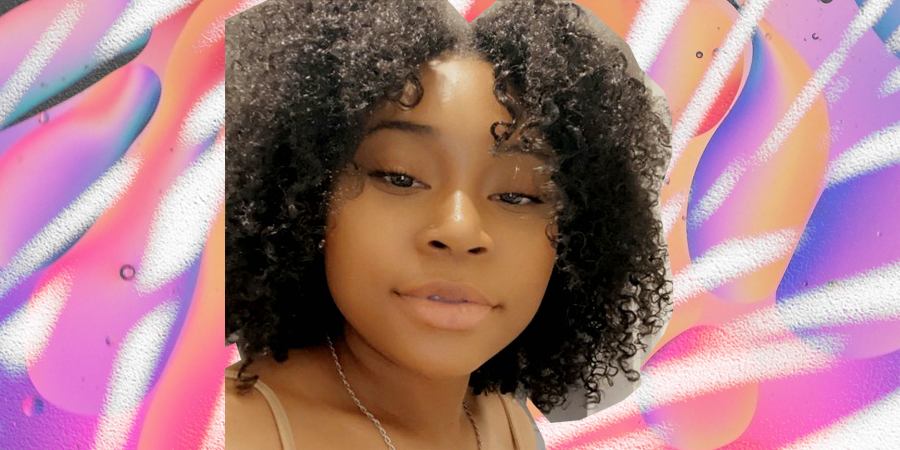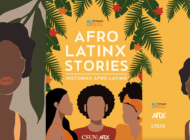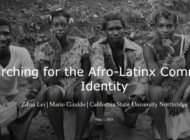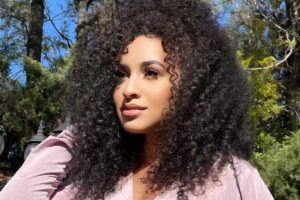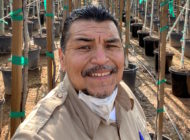In this episode, Liliana Ramírez talks to Alexis Amezcua, a senior at Cal State University Northridge, about how her African-American and Mexican roots connect her to each culture.
By LILIANA RAMÍREZ
EL NUEVO SOL
Liliana Ramírez: Welcome to Radio Neplanta, a podcast by El Nuevo Sol, the multimedia site for the Spanish-language journalism program at California State University at Northridge. My name is Liliana Ramírez. The title of this series is Afro-Latinx. We want to tell here diverse stories of Afro-Latinx, Black-Latinx, and Afro-Latin American identity. According to the Pew Hispanic Center, one out of every four Latinos in the nation identify as Afro-Latins. This is the same proportion of Afro-Latin Americans in that region. We decided to use the term Afro-Latinx—with X—to be inclusive of non-binary people. The umbrella term “Black Latinx” refers to biracial people with one African-American and on Latinx parent. The umbrella term “Afro-Latin American” refers to people of African ancestry in Latin America.
In this episode, I interviewed Alexis Amezcua, a senior student at California State University at Northridge (CSUN). We talked about her experience growing up. She explains how her African-American and Mexican roots connect her to each culture.
Alexis Amezcua: My mom is African-American and my dad is Mexican. He is a first generation—and his whole family comes from Guadalajara and my grandparents immigrated over here and then they started their family over here. And all these kids had tons of kids over here in California.
Liliana Ramírez: Alexis grew up knowing how to only speak English. Although she doesn’t speak Spanish she understands most of it. When she visits her dad’s side of the family in Mexicali, Mexico, she tries her best when she communicates with her grandparents. Alexis is amazed at all the things her family can do, while living in a third world country.
Alexis Amezcua: I really like it (Mexicali)—to me, it looks like California. I don’t care what anyone says. It is so close to the border anyways. Some of my cousins’ houses are super nice and they’re like,“Yeah we built this from the ground up.” And it makes me like so proud because they did all this by themselves and they didn’t need anyone else’s help nor “American money” to do it. I truly love it. It’s really beautiful out there and I love the food! I can eat, eat, eat—I don’t care.
Liliana Ramírez: Being Afro-Latina, Alexis identifies herself as an African-American rather than an Afro-Latina. However, sometimes she does try to input both races on paper—but it is never an option. She typically has to choose either one. People have the tendency of doubting her own identity.
Alexis Amezcua: When I do it (identify) around certain people, they’re like, “no you’re not,” or “speak Spanish,” “you’re not light enough,” or be like, “you look Black.” To save the hassle of explaining or hearing all the words and stuff, I just say I’m Black because I don’t want to hear the criticism, or people telling me I’m not what I am.
Liliana Ramírez: Alexis was raised to see everyone the same. Growing up, she did not know the definition of race. Her parents taught her to not discriminate against anyone for the color of their skin.
Alexis Amezcua: So, once I got to Arkansas, people were like, “your hair is good,” “you don’t look all Black, you look mixed.” That’s when I started asking questions like, “Oh, am I fully Black?—like I don’t know.” That’s when I would respond that I was Afro-Latina. I was pretty much depicted as different and because I was mixed with good hair. That’s when I really started to realize that I’m Blaxican or Afro-Latina.
Liliana Ramírez: Alexis was born in California and moved to West Memphis, Arkansas at the age of 7 and then later moved back to California as a teenager. When she first moved to Arkansas she experienced a culture shock and was not aware that many people have never seen a person of color.
Alexis Amezcua: I just had to realize that not every place is going to be so open and openly accepting of that—at such a young age. Because California is very diverse and we call it a very liberal state, even though it pretty much isn’t. But, Arkansas is a very conservative state so everything that is normal here, is not normal there. There’s people who were born and raised in Arkansas and probably never went out of state before. In that state or in that city there’s only like African-Americans and you don’t see any other cultures, like Latino, unless they’re in a Mexican restaurant, or Asian-American, unless they were in a Chinese restaurant, nail salon or owning a beauty supply. You literally did not see anybody else besides African-American and White people. So, people didn’t recognize what other people looked like unless it was on TV. And if they saw it on TV, they recognized it as exotic or foreign.
Liliana Ramírez: Many people in Arkansas assumed Alexis was African-American because of the color tone of her skin. She felt like she did not have enough characteristics of either race. Arkansas natives judged her accent and texture of hair.
Alexis Amezcua: I didn’t talk the same—my dialect is different, people from there speak very very slow. If I would wear my hair curly it would be a shock to them because people don’t wear their hair like that out there. It is usually always straight or in braids. I try to wear my hair curly all the time. I have type four hair, which is very coarse and curly hair—I have a lot of defined curls. In Arkansas a lot of people perm their hair to have it straight. Back then my hair was super long, pretty much to my waist. So, they’ll see curly hair—if I wear my hair curly, they would be like, “oh my god, why is your hair that curly?” They are just not used to that there. If I had my hair super straight, they’d see it super long—they would be like, “o.m.g. your hair is so long, you have good hair.” They’ll touch my hair, and be like, “that’s good hair.” They’re not used to that because their hair is permed—a lot of breakage happens, so their hair is shorter.
Liliana Ramírez: Alexis believes that being Afro-Latinx has its pros and its cons. She likes the fact that she gets to experience two different cultures which she will pass down to her future children. The only con about being mixed is that she doesn’t feel like she’s enough of either race.
Alexis Amezcua: The artist Miguel says in a song: “He’s too dark for the Mexicans, and not Black enough for his Black culture.” I like to completely feel that because sometimes you may not be Black enough to represent the Black community, or the Black community will shut you down because you’re not Black enough. You don’t have a lot of that culture with you that you grew up with, like they did. For example, you didn’t grow up like them—you don’t know a certain movie, or eat a certain food, talk like they do. You didn’t have that one scar. Like everyone falls and has a scar on their knee. Same thing with the Mexican community—like all my cousins and my dad has the TB shot scar in their arms. One of my friends asked me to show her the TB shot or you’re not Mexican. I’m like, “what?—I don’t need one.” If you don’t have a certain aspect from either of the cultures , I believe those cultures feel like I’m not good enough for them.
Liliana Ramírez: Alexis’ friends accepted her for who she is—they didn’t judge her based on her race or color of skin.
Alexis Amezcua: I have friends from third grade all the way to eleventh grade—they’re okay with it, they don’t really care. I’m still friends with them now. They are okay with it. My friends out here (California) are okay with it too. (Being Afro-Latina) if i say something, they be like, “ahh, you do that too?” They were so shocked. I think the people out here are more shocked that I’m Mexican than people in Arkansas because there’s a big population of Afro-Latinas here. But I guess they just don’t see it or they don’t want to believe it because my skin is so dark, I guess?
Liliana Ramírez: She faces criticism from the internet trolls when they tell her she’s not enough of a Mexican or African-American to join the conversation.
Alexis Amezcua: On Twitter or TikTok people are like, “you look Black, you can’t be us, you’re not invited to the carne asada.” I’m like, “okay?—but I’m already there, I don’t know what to tell you guys.” They respond by saying, “your skin is too dark for this.” I’m like, “that’s fine, you do know that there are Black Mexicans and there are people who are darker skin that are Hispanic and Latinos.” (For) example, people who are from Honduras. I believe they have really really dark beautiful skin and they’re still considered latino-Hispanics. It doesn’t bother me anymore that people try to fight with me because of my skin color. I just be like, “you sound racist,” and it’ll back peddle. And they’ll be like, “I need to learn.” Calling Hispanics racist—they want to learn because they don’t want to be labeled as a racist person.
Liliana Ramírez: Alexis is a proud Afro-Latina and will continue to be herself even if other people do not accept her. She embraces both of her cultural roots.
Alexis Amezcua: We’re making our own culture and we’re trying to get it out there. It is something to be proud of, so, it’s like having your own nationality.
Liliana Ramírez: Thanks for listening to Radio Neplanta: La Voz que Traspasa Fronteras. We invite you to listen to the rest of the series Afro-Latinx… We will tell you stories of Afro-Latinx identity.
Listen to our podcast on your favorite platform. You can also check our SoundCloud channel—El Nuevo Sol—or our website: ElNuevoSol dot net.
This was a production of El Nuevo Sol—the multimedia project of the Spanish-Language Journalism program at Cal State University, Northridge.
This episode was produced and edited by Liliana Ramírez.
Voices: Liliana Ramírez and Alexis Amezcua.
Music by the Afro-Colombian group Kombilesa Mi.
See you next time.
Tags: #AFLX Afro-Latinx Alexis Amezcua Liliana Ramírez podcast Radio Nepantla







